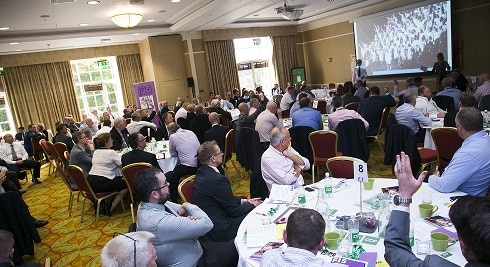During the last 12 months, skills and training has pushed payment off the top spot of challenges facing the sector. A series of insightful presentations at this year’s FIS annual conference included a look into the future through the eyes of Build UK, the Construction Products Association, CITB and Travis Perkins, and a thought-provoking view about mental health from Lend Lease.
“We don’t want to be a traditional association, we want to be a vibrant and active organisation that helps our members to find solutions,” said David Frise, FIS chief executive, in his opening address stating how community, skills and training, and technical standards are the top three priorities for FIS.
Suzannah Nichol MBE, chief executive at Build UK, told delegates how main and specialist contractors are now working together at Build UK, seeking to improve resources, tackle payment and improve efficiency of the prequalification process.
Ms Nichol MBE said: “We need to change a lot. And to do this we have to stretch ourselves and move out of our comfort zone. We have the capability and the opportunity, but to do so we must want to change.”
Ms Nichol thought that taking on only 10,000 apprentices a year is dismal and that the £163 million in training levy should be spent more wisely.
Summing up, Ms Nichol said: “There are now greater opportunities to create consensus because the supply chain sits around the same table. We mustn’t make it complicated; everyone wants to get paid. We can all win, but to do so we must be prepared as a team to do our part.”
Dr Noble Francis, chief economist at the Construction Products Association, was positive about future prospects with steady, but slowing, growth anticipated for the rest of the decade, driven by lower energy prices, business investment and rising wages. However, uncertainty over Europe and a slower Chinese economy could impact on growth.
Turning to each sector, Dr Francis noted that housing demand is dependent on affordability while he considered that education was still buoyant; however, health sector growth forecasts are slightly more cautious.
Commenting on the commercial market, Dr Francis saw the London market slowing and increasing activity elsewhere, especially in Birmingham and Manchester. In retail the focus is now on smaller units which could create more opportunities for fit-out contractors.
Concluding, Dr Francis said: “During the recession more than 400,000 people left the industry; the skills shortage is now the big concern.”
John Carter, chief executive at Travis Perkins plc, the builders merchant and distribution giant, offered an insight to the market and agreed that resources is key, which is why Travis Perkins is aiming to employ 1,000 apprentices to ensure they have the right resources for the future.
Mr Carter said: “Our response to the changing market has been to invest in a more efficient supply chain. The explosion in mobile now means everything can be done through a smartphone and tablet.
“One of the only ways to meet demand going forward is to approach construction in a different way, for example, with more advances in modular construction on-site. We’re having to look at how we change to service more off-site production factories rather than traditional construction sites.
“Customer relationships are important and the only way forward is to respect where skills and resources sit, and those who won’t change will struggle. Price and availability are key to winning and retaining business.”
Martin Coyd OBE, from Lend Lease, outlined how health and wellbeing has become more of a focus for employers recently and how greater emphasis is being placed on mental health issues.
Mr Coyd OBE said: “One in six people has a mental health challenge and men generally don’t talk about it. It’s a condition that people discriminate against, and those who suffer don’t want to talk about it which can, in extreme circumstances, lead to suicide. Everyone is facing greater stress today and unless you can help to relieve the pressure it can have serious consequences. It does affect performance so there are good business reasons to deal with it.
“We’re launching ‘Mates in Construction’ at next year’s Construction Health Summit to make a difference and breakdown barriers. We want to help employees through their problems and change attitudes to a serious problem that can affect anyone.”
CITB chief executive Adrian Belton concurred with concerns about mental health and went on to report that CITB was in the vanguard of change to meet its customers’ needs more efficiently. CITB has spent the last 12 months removing unnecessary tiers of management and has started to move away from delivering direct training to become an enabler and promoter.
One of the big changes has been the streamlining of grants. Gone are the days of 50 types of grants; now there are just two types and CITB is using its funds to secure better outcomes.
Mr Belton said: “In future we’re going to be more like investment fund managers managing pots of funds and looking for a return on our investments with clear objectives that will benefit the industry. We want to get a bigger bang for our buck.”
So what had delegates gained from the day? The industry is well into recovery and despite a few hiccups it’s growing, but to secure sustained growth attitudes and culture must change to keep pace with a changing world.


